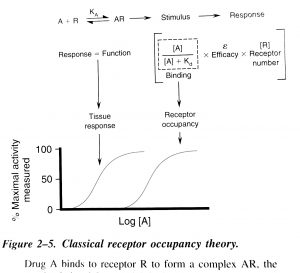Monthly Archives: January 2019
It is true that it feels like I have had a huge exam. I still need some time to do nothing before I continue to write. I listen a lot to music, make good food, watch entertaining series. Read some. Write here. Meanwhile, I have thought of teaching. Pharmacology. Basic pharmacology. Classical receptor pharmacology. Since I work at a pharmacy, I work daily with teaching. I might not explain the exact pharmacological mechanism for the exerted clinical effect, but at least I explain how to use the medicin in the right way to get the best effect of the drug.
If you use a too low dose you don’t get any effect of the drug. And if you use a to high dosage, significant adverse effects may occur. This is called the therapeutic window. Furthermore, potency is an important term within pharmacology. Potency of a drug is defined as that concentration at which the drug elicits 50 percent of its Emax (E = effect, eg blood pressure). If a drug is potent it means that a very low dose is needed to have a significant clinical effect.
Something that is very important to keep in mind is that biologic variation is very common. That is variation in magnitude of a biological response (eg cognitive function) in a population of patients given the same dose of the drug. This variation depends on eg how the drug binds to the receptor and this is clarified in the illustration above (Goodman & Gilman). You see the drug concentration on the X-axis and the effect of the drug on the Y-axis. The affinity to the receptor is explained by the chemical forces that cause the drug to associate with the receptor, like a hand in a glove. There is always an equilibrium between the drug and the receptor. This can be measured by complex mathematical formulas like the illustration above.
The law of mass action.
Two other important terms within pharmacology are: agonist and antagonist. An agonist stimulates the receptor to exert a specific biological response, and an antagonist block the receptor. Metoprolol is a typical β1-antagonist where pulse and blood pressure are lowered due to blockade of the adrenergic receptors located mainly in the heart.
This is a brief theoretical introduction to basic pharmacology. To make it easier to understand, there is an illustration from Hesselmar and co-workers (2018), where they studied if animal allergen in early life can reduce the risk to develop allergy. It seems like dog- and cat exposure can protect against allergic manifestations like asthma. A “mini-pharm” effect that was dose-response dependent. The full study can be downloaded here:
New year has begun with same wishes as last year. No big changes. Training tomorrow. I have had a few days off and I have really been in need of that. Season holiday is great. I have thought some of 2018 and I don’t know why but I thought of the evening I spent at Universitets Aulan in Uppsala where various authors presented their books. This evening was a turning point for me since it really became apparent that I no longer have much focus on pharmacological mechanisms but rather study languages nowadays. I am very found of history and culture, and you can find this atmosphere in Uppsala. The 2nd of July 1477, Uppsala university was permitted by a signed letter by authorities to teach students, but there were also obligations accompanied with that agreement.
Before the lecture started at Universitetsaulan, I walked through the building with my camera. On the second floor there are different rooms where various faculties are represented. I remember that when I started studying in Uppsala I didn’t understand why all lectures began 15 minutes after every hour. Many centuries ago students didn’t have watches, so to be on time, the church bell rang eight times every hour. Then everybody knew they had approximately 15 minutes to go to the lecture. This is a so called “akademisk kvart”.
I did my pharmacy studies in Uppsala, but I continued to study in Gothenburg. Göteborg University started in 1891 and is not as old as Uppsala University, and therefore an “akademisk kvart” doesn’t exist. I remember I attended a dissertation in Gothenburg where the opponent was a professor from Uppsala. With a glimpse in his eye, he said that Uppsala University is more trustable since it is more developed.
Universities.
Sometimes, I actually still read some academic publications. By chance, I saw an interesting study about future risks of asthma and dogs (Fall T et al, Scientific Reports: 2018 Nov 15;8(1):16899). Since I fancy dogs I read the study. The main finding was that dog-exposed children had less asthma compared to other children at a certain age. Only female dogs and not male dogs. Interesting. However, the study should be repeated since confounders such as life-style and/or dog management may vary among dog-owning families. And possibly, female hormones can influence. You can down load the full article on this link: 10.1038/s41598-018-35245-2
That is all for this evening.
2019 arrived safely. As I wrote previously, my books have been in focus last year. It takes time to be able to look forward. To get a new focus. I need time to let the books settle, and then I can move forward. Maturation, maybe. Like a baking process which can be traced as far as to the Egyptians in 3000 BC.
First, to make the dough, then the yeasted dough rises, baking, and then fermentation again – the final proof is a continuation of yeast fermentation, which allows the molded dough piece to relax and expand. Furthermore, the remaining period of fermentation is called oven spring. Aroma development of the bread has been found to be dependent on yeast concentration, mixing stage and fermentation time.
This is literally speaking. When I did my PhD studies, I was told this. Writing takes time and there are many ingredients making the final result. Like personal development which is difficult to pinpoint but could be described by fermentation.
The beginning of a New Year is for me associated with music. The Vienna New Year’s Concert which always include pieces from the Strauss family. Classical music is so beautiful and it can make me shiver if I am in the right mood. I would like to begin this New Year, 2019, with Pavarotti & friends. This unites my book, that I have dedicated to friends, with something beautiful such as music. And poetry.
Libretto (La donna è mobile)
Woman is fickle
Like a feather in the wind,
She changes her voice — and her mind.
Always sweet,
Pretty face,
In tears or in laughter, — she is always lying.
Always miserable
Is he who trusts her,
He who confides in her — his unwary heart!
Yet one never feels
Fully happy
Who on that bosom
— does not drink love!
- 1
- 2


 Svenska
Svenska
